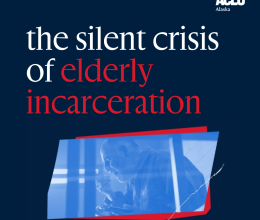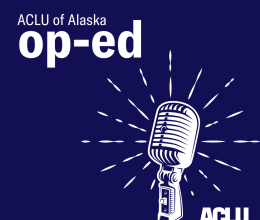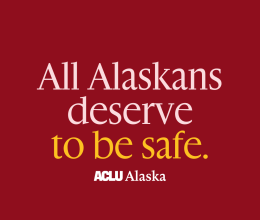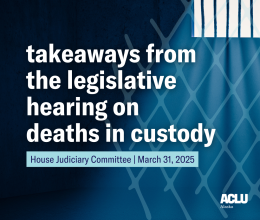
The Alaska Civil Liberties Union of Alaska believes Indigenous peoples and their governments have inherent sovereignty, the right to govern themselves and their lands and determine their own futures. This sovereignty predates the existence of the United States, the drafting of the Constitution, and Alaska statehood.
We support the fundamental human rights of Alaska Native people to live and protect their ways of life and the freedom to engage in traditional ways of governing, being, healing, and knowing; learning and celebrating their cultures, languages, traditions, and heritages by their ceremonies and other practices.
Alaska Native tribes have continuously existed as self-governing bodies from time immemorial. The ACLU of Alaska recognizes that Alaska Natives and their tribes have other distinct rights and responsibilities arising from their special government-to-government relationship with the United States, in addition to the constitutional rights to which all individuals are entitled.
The ACLU of Alaska has worked to protect and promote the rights of Alaska Native and all Indigenous people throughout our existence. Currently, we are working to root this work in an Indigenous Justice framework that is Indigenous-centered, culturally authentic, and community-directed. We aim to support Indigenous communities and follow their lead in pursuing the freedoms described above and in continuing the work described below. We strive to honor Indigenous worldviews and values in our approaches and strategies.
Among the specific rights the ACLU of Alaska supports for Alaska Native and Indigenous people include:
- A tribal land base and natural resources
- Tribal self-government and self-determination
- Legal authority for the welfare of Alaska Native and Indigenous children
- Retention of their cultural and religious heritage
- Enforcement of the commitments made to them by the United States
- Access to traditional hunting, trapping, fishing, and gathering areas for subsistence purposes.
The ACLU of Alaska works in spaces that intersect with Indigenous Justice, including:
Criminal Legal Reform
The ACLU of Alaska works to address a wide range of issues in the criminal legal system, such as guaranteeing humane conditions within prisons, creating meaningful opportunities for rehabilitation and reintegration into the community, and seeking greater transparency and accountability for rights violations.
The Alaska Prison Project centers on restorative justice, healing, community safety, diversion, and alternatives to incarceration to transform Alaska’s failing criminal legal system. The Prison Project is dedicated to ensuring that our state’s jails and prisons comply with U.S. and Alaska Constitutional law and to ending policies that criminalize poverty, substance misuse, and mental health issues resulting in disproportionate incarceration rates.
Recently, we have worked to draw attention to the decades-long disproportionately high rate of Alaska Native people who are incarcerated. The Prison Project is currently investigating the record-breaking number of prison deaths that occurred in 2022 and that continue to occur in 2023.
Cases
Hardy v Nome (2019)
Roberts v. City of Fairbanks (Fairbanks 4 Civil Rights Claim Appeal Amicus, 2019)
Hall v. Alaska Department of Corrections (2018)
Olson v. Hooper Bay (2016)
Voting
The ACLU of Alaska works to protect and expand the right to vote through legislation, litigation, and voter education. Our overarching goal is to confront and eliminate observed barriers to voting, to ensure that all eligible voters have an equitable opportunity to cast a ballot that will be counted, and to ensure that our state’s elections are accessible for all.
We strive to defeat laws restricting the right to vote, address race discrimination in voting, especially in Alaska Native communities, and promote electoral reforms to increase access to the ballot. Currently, we are engaged in litigation in response to the alarmingly high number of ballots rejected in predominantly Alaska Native communities during the special election in 2022. We are also working to pass policy reforms that will address the disenfranchisement of Alaska Native voters, especially those in rural Alaska whose ability to vote is affected by inadequate staffing of polls and post offices, a failure by the state to fulfill its language assistance obligations, and the lack of a ballot curing system that works for all of Alaska.
Cases
Arctic Village Council, et al v. State of Alaska, Department of Elections (2022)
Arctic Village Council v. Meyer (2020)
Ahmasuk v. State of Alaska (2019)
Alaska v. Holder (2010)
Nick v. Bethel (2010)
Two- Spirit and Trans Rights
Anti-queer and anti-trans policies are rooted in colonialism. Before colonization, communities worldwide, including Indigenous communities in Alaska, honored and uplifted gender-fluid and gender-expansive identities. Two-spirit refers to Indigenous folks in the LGBTQIA2S+ community who have both a masculine and feminine spirit. While the identity has existed in Indigenous communities for generations, the term two-spirit was first coined by an elder in 1990. The 2S in LGBTQIA2S+ stands for two-spirit. The ACLU of Alaska seeks to grow in its capacity to address the intersecting levels of oppression that Indigenous queer, trans and 2S people face as we build a liberatory practice that fully integrates Indigenous justice and Trans Justice as part of the same effort to decolonize.
The ACLU has a long history of supporting and defending the rights of LGBTIA2S+ Americans and is proud of our wins around marriage rights at the U.S. Supreme Court and in states around the country. In Alaska, we won the right for transgender Alaskans to denote their lived gender on a driver's license in 2011. In 2014, we helped guarantee that same-sex couples cannot be denied tax exemptions guaranteed to opposite-sex married couples. In 2018, the ACLU of Alaska helped ensure that Anchorage voters rejected a ballot measure prohibiting transgender people from using the bathroom aligned with their gender identity. The ACLU of Alaska is currently working to advocate against anti-trans policies and regulations at the statewide and local levels, including a statewide regulation that bans trans girls from participating in school sports, and troubling policies that have emerged from the Mat-Su School Board.
The ACLU of Alaska is proud to work alongside and behind Native-led organizations and entities that are leading efforts to make our communities safer and more just. We look forward to celebrating the rich history and leadership of Alaska Native Peoples at the Alaska Federation of Natives Convention in Anchorage from October 16-21. Stop by the ACLU of Alaska booth to meet our staff, get updates on our work, and pick up some swag.



